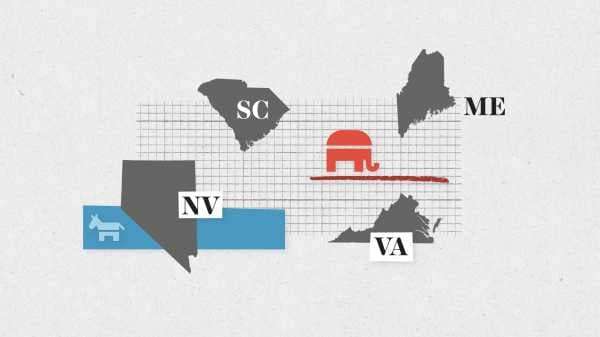
Voters in Virginia, Nevada, Maine, North Dakota, and South Carolina head to the polls Tuesday for important 2018 primary elections.
Nevada Democrats will formally pick their candidate in their bid to unseat Sen. Dean Heller. In Virginia, at least four House Republican incumbents should be vulnerable in November. Maine presents one of Democrats’ best chances to retake a governor’s mansion as they seek to rebuild the state-level control they lost under President Obama — and the state will be piloting a fancy new ranked-voting system, the first of its kind in the United States.
Here is every June 12 primary election you need to know about, briefly explained.
Virginia
Virginia’s Second Congressional District: Democrats favor another female veteran to challenge Scott Taylor
Who is the Republican? Rep. Scott Taylor, former state legislator, first elected in 2016. He voted for Obamacare repeal, the tax bill, and a 20-week abortion ban.
Who are the Democrats? Elaine Luria is a former US Navy commander who now runs an art studio. She has earned the Democratic Congressional Campaign Committee’s Red to Blue imprimatur, which means the national party thinks she’s shown she can be a credible candidate. She also has the endorsements of Emily’s List and End Citizens United.
On Tuesday, her only challenger is Karen Mallard, a schoolteacher who says that President Trump’s nomination of Education Secretary Betsy DeVos inspired her to enter the race.
What’s the story here? The Cook Political Report considers this a Lean Republican race. But in 2016, though Taylor won handily, Trump beat Hillary Clinton by just 3 points. It’s a pretty diverse district too: 68 percent white, 20 percent black, 5 percent Asian, 5 percent Latino.
Taylor is an incumbent, which gives him an advantage, but he is hardly an entrenched one. The left-leaning Public Policy Polling found Luria trailing by just 6 points in an April poll. Based on what we’ve seen in special elections and in Virginia last year, it wouldn’t even take much of a wave to make this race competitive.
Virginia’s Fifth Congressional District: an open seat opportunity for Democrats after Tom Garrett stepped down
Who is the Republican? Scandal-plagued Rep. Tom Garrett announced he would step down in late May. In place of a primary, under the circumstances, the local party nominated Denver Riggleman, a local distillery owner. He has promised to join the archconservative House Freedom Caucus if elected, of which Garrett was a member.
Who are the Democrats? Like the Republicans, Democrats elected to have a nominating convention instead of a primary election. They picked Leslie Cockburn, a former reporter who supports Medicare-for-all.
What’s the story here? Cook rates the Fifth District, which represents a big middle chunk of the state just west of Richmond, as Lean Republican and R+6. But the district did vote for a Democrat in the 2008 blue wave, and the GOP just lost the incumbency edge when Garrett retired. Then again, Trump won here by 10 points in 2016. This isn’t the suburban Republican, Never Trump kind of district propelling so much of the Democratic hopes in 2018. It’s a bit of a long shot, but Democrats could have a chance here in November, though it would be their biggest lift.
Virginia’s Seventh Congressional District: Dave Brat suddenly finds himself in jeopardy
Who is the Republican? Incumbent Rep. Dave Brat. He is a former college professor who famously ousted then-House Majority Leader Eric Cantor from the right in 2014. He’s one of the most conservative members of the House.
Who are the Democrats? Abigail Spanberger is considered the favorite. She’s a former federal law enforcement officer and CIA operative and has amassed support from a lot of local leaders. She is facing Dan Ward, a retired military colonel. It’s worth noting that in Democratic primaries where the top choices are a man and a woman, women have been winning a lot.
What’s the story here? Brat is an archconservative who knocked out an establishment Republican, but his district is changing. Trump won by 6 points here after Mitt Romney won by 11 in 2012. It swung 8 points toward Democrats in the governor’s race last year. There are a lot of younger, more affluent, and better-educated voters in the district, which covers parts of the Richmond suburbs.
According to Cook, it’s an R+6 district, so this is far from a slam-dunk for Democrats. But party operatives insist they genuinely believe they could remove one of the furthest-right members of the House in a wave year.
Virginia’s 10th Congressional District: Barbara Comstock is one of the country’s most vulnerable House Republicans
Who is the Republican? Incumbent Rep. Barbara Comstock, first elected in 2014 and long pegged as one of 2018’s most vulnerable Republicans. A former Bush administration official, Comstock voted against Obamacare repeal but for the tax bill. It’s the latter that could land her in trouble, since the individual mandate repeal is being cited by insurers as a big reason for coming premium hikes for 2019. She does have a primary challenger: Shak Hill, a former Air Force officer and ex-Senate candidate running to her right.
Who are the Democrats? State Sen. Jennifer Wexton is probably the frontrunner: She has name identification on her side, and she’s well-liked by many different factions. She can also run on Virginia expanding Medicaid. But she has some legitimate challengers: Alison Kiehl Friedman worked at the State Department under President Obama, Lindsey Davis Stover worked at the VA under Obama and on Capitol Hill, and Dan Helmer is a veteran running the furthest to the left.
What’s the story here? The 10th sits near the top of Democratic targets in 2018. Cook pegs it actually D+1, and Clinton beat Trump here in the Washington, DC, suburbs by 10 points(!) in 2016. Everybody thinks this is a toss-up race.
Comstock has defied the party on at least one major item — the House Obamacare repeal bill. But Democrats are going to pin premium hikes on her after she voted for the mandate repeal, and they say the tax bill particularly adversely affected Virginia by rolling back the tax exemption for state and local taxes.
She has represented the area in one way or another for nearly 10 years, and she can expect a lot of support from national Republicans. If Democrats are going to take back the House, they absolutely need to beat Barbara Comstock and other Republicans like her.
(Also, we are obligated to mention Nathan Larson, the independent candidate in this race, whom the Washington Post described as being “pro-incest, pedophilia, and rape.” He is not a real contender, but he’s gotten attention for his repulsive platform, if you want to call it that, as a self-identified “incel” candidate.)
Virginia Senate: Tim Kaine is almost definitely going to win reelection
Who is the Democrat? Incumbent Sen. Tim Kaine, first elected in 2012. Former governor and vice presidential candidate. Dad. Dork.
Who are the Republicans? Libertarian state lawmaker Nick Freitas, former gubernatorial candidate Corey Stewart, and former lieutenant governor candidate E.W. Jackson. It’s quite a crew: Stewart keeps getting linked to white supremacists. Freitas has the backing of some high-profile libertarians, like Sens. Mike Lee and Rand Paul. Jackson thinks gay people are sick and yoga is Satanic, and, as a black man, he says he still opposes taking down Confederate monuments. Stewart was ahead in the one poll we’ve seen, but most voters said they were still undecided.
What’s the story? Kaine is almost definitely going to win. Virginia has been trending strongly blue since Trump’s election, with Democrat Ralph Northam winning the governor’s race last year. Early polling has Kaine over 50 percent and leading any of his three potential Republican challengers by 20 points. Cook says this is a Solid Democrat race. But we had to mention it.
Nevada
Nevada Senate Democratic primary: Jacky Rosen readies to take on Dean Heller
Who is the Republican? Sen. Dean Heller, first appointed in 2011. Heller’s voting record in the past year wouldn’t give you any indication that he’s running for reelection in an increasingly Democratic state. He’s voted with Trump almost 92 percent of the time. After announcing that he would oppose any Republican effort to repeal and replace Obamacare in June 2017, Heller went on co-sponsor an Obamacare repeal-and-replace bill with Sens. Lindsey Graham (SC) and Bill Cassidy (LA) that would have cut Nevada’s federal health care funding by $257 million. He voted for the GOP tax bill, which repealed the individual mandate and is expected to raise premiums in Nevada.
Who are the Democrats? The clear frontrunner is Rep. Jacky Rosen. Her political history is very short. In 2016, as a political newcomer, she narrowly won a House race in Nevada’s Third Congressional District against Danny Tarkanian in her first bid for elected office. Her background is in computer programming and consulting, which she says has trained her to be a problem solver. Rosen has half a dozen challengers, but she’s far and away the favorite to emerge on Tuesday.
What’s the story? Heller is the only Republican senator up for reelection in a state Clinton won in 2016. He has a 2-point net approval rating, and President Trump is underwater in the state. Nevada Democrats also have a big advantage: They have about 60,000 more registered voters in the state than Republicans do. Election prognosticators think this is a toss-up race, mostly on the strength of Heller’s incumbency, but the senator should be considered extremely vulnerable.
Nevada governor: Democrats navigate a tense primary as they try to buck a nearly 20-year lockout from the governor’s mansion
Who are the Democrats? Clark County Commissioners Steve Sisolak and Christina Giunchigliani are the favorites among a field of six, with things getting increasingly tense between the two in recent weeks. Ahead of the primary, Sisolak and Giunchigliani have traded barbs over everything from the mass shooting that took place in Las Vegas to a proposed bill that addresses the treatment of sex offenders.
Polls give Sisolak — who’s amassed a $6 million war chest — a slight edge, but the bitterly contested race is still pretty close.
Who are the Republicans? A whopping seven Republicans are in the running, and state Attorney General Adam Laxalt is expected to come out on top. Laxalt is known for backing the Trump administration’s hardline stance on immigration — signing on to a letter last year that sought to prevent Nevada from becoming a “sanctuary state” and joining a lawsuit in 2015 that challenged the Obama administration’s expansion of the Deferred Action for Childhood Arrivals program.
Laxalt has also secured donations from big-ticket Republican names including Sheldon Adelson and the Freedom Partners Action Fund, a group that’s linked to the Koch brothers. His grandfather, Paul Laxalt, was previously a governor and senator for the state, and his father is late New Mexico Sen. Pete Domenici.
What’s the story? Nevada hasn’t had a Democratic governor for nearly two decades, but the seat is currently rated as a toss-up by Cook Political Report. Since current Republican Gov. Brian Sandoval is term-limited out, Democrats are hoping to capture the momentum from Clinton’s 2016 victory — when she won the state by 3 points — and retake the seat.
Nevada’s Third Congressional District: a long list of candidates vie for Rep. Jacky Rosen’s seat as she pursues the Senate
Who are the Democrats? Philanthropist Susie Lee leads a field of seven in both endorsements and fundraising. Lee, who has been named to the DCCC’s Red to Blue list, has secured endorsements from incumbent Jacky Rosen, former Senate Minority Leader Harry Reid, and former Vice President Joe Biden. She previously ran unsuccessfully for Nevada’s Fourth District in 2016. Business exec Jack Love and computer programmer Michael Weiss are also among those on the ballot.
Who are the Republicans? The most notable candidate and likely frontrunner is Danny Tarkanian, a businessman who filed for the House race after Trump asked him to clear the Senate primary for Dean Heller. There are nine total contenders including state Sen. Scott Hammond and former television reporter Michelle Mortensen. This wouldn’t be Tarkanian’s first time campaigning to represent this district if he wins the primary. Rosen beat him out for the seat in 2016.
What’s the story? Democratic incumbent Jacky Rosen has opted not to pursue reelection in order to run for the Senate, and a large slate of candidates has poured in to compete for the historically swing seat. Cook Political Report categorizes the district as leaning Democratic this election, even though Trump won it by a slim margin in 2016.
Maine
Maine is doing something weird: ranked voting. Voters in the Democratic and Republican primaries will rank their candidates in preferred order. If no candidate gets 50 percent on the first go, the lowest-ranked candidate will be eliminated and the second-place votes of their voters will be distributed. That will be repeated until a candidate hits 50 percent.
Maine governor: a big chance for Democrats to replace arch-Republican Paul LePage
Who are the Democrats? In the best poll we have of the race, Janet Mills — Maine’s attorney general since 2013, and a state lawmaker before that — was way ahead of the field, with 32 percent of the vote. So while she is the frontrunner, she has some credible challengers. Mark Eves, a former Maine House speaker, had 16 percent of the vote, good enough for second place, in the poll we have. State Sen. Mark Dion had 10 percent. Democratic organizer Adam Cote was the other notable finisher at 9 percent.
Who are the Republicans? Business executive Shawn Moody is the leader in the Republican primary based on the best available polling, sitting at 36 percent. But he doesn’t seem to have a majority and faces several credible Republican challengers.
Mary Mayhew — who, as LePage’s top health official, has been instrumental in helping to block the Medicaid expansion — came in second at 19 percent, and she has also said she will continue to obstruct expansion. Garrett Mason, the Maine Senate majority leader, registered third at 15 percent, and House Minority Leader Ken Fredette was fourth with 10 percent.
What’s the story? Medicaid expansion has been a big issue here — Maine voters supported in a 2017 ballot referendum but outgoing Republican LePage has obstructed it — and every Democrat has said they would implement it if elected. In a mirror image of the Democratic content, there seems to be no daylight between the Republican candidates on Medicaid expansion; they all want to stop it.
Whoever emerges from both parties’ primaries, the November general election should be competitive. Cook Political Report rates the race a toss-up, while the University of Virginia’s Crystal Ball thinks it leans toward the Democrats. LePage is pretty unpopular: 41 percent of Mainers approve of his job performance and 53 percent disapprove, according to Morning Consult. Then again, he’s been elected twice and Trump lost narrowly (3 points) in 2016.
Maine’s Second Congressional District: in an effort to retake the House, Democrats lean into health care to sway voters
Who are the Democrats? State Rep. Jared Golden, bookseller Craig Olson, and nonprofit director Lucas St. Clair.
Golden and St. Clair have the lead on fundraising. Golden is a veteran of the Iraq and Afghanistan wars and a former staffer for Sen. Susan Collins. St. Clair is a conservationist and the son of Burt’s Bees founder Roxanne Quimby. He played an active role in pressing then-President Barack Obama to preserve Katahdin Woods and Waters as a national monument.
Who are the Republicans? Two-term incumbent Bruce Poliquin seeks to defend his seat. He’s come under fire for supporting Republican efforts to repeal Obamacare, something Sen. Collins voted against last year.
What’s the story? While Trump took this district in 2016 — marking an unprecedented split of Maine’s electoral votes — Democrats aim to focus on health care in an effort to flip voters. Poliquin was one of the swing votes on the House Obamacare repeal bill, and his vote in favor of the plan is likely to be held against him. Cook says this district is just R+2 (meaning it leans just 2 points toward Republicans compared to the nation as a whole) and rates it Lean Republican.
South Carolina
South Carolina’s First Congressional District: Mark Sanford faces an unexpectedly tough Republican primary
Who are the Republicans? The real news is that Rep. Mark Sanford — who was first elected in 2013; you may remember his sex scandal as South Carolina governor — seems to have a legitimate primary challenge. Sanford is actually a comparatively more moderate House GOPer and has occasionally criticized Trump. State lawmaker Katie Arrington is running a campaign to his far right, portraying him as, as Politico put it, “a disloyal Never Trumper.”
This race popped up on the radar when Politico reported Sanford was going on TV to attack Arrington, which suggested he felt some heat. He wouldn’t be the first House Republican to struggle in 2018 for being insufficiently loyal to the president.
Who are the Democrats? It’s a two-person race: Toby Smith and Joe Cunningham. Smith described herself as a protest candidate, saying, “Let me be clear: I’m a protest candidate. I’m protesting the upsurge of racism. I’m protesting the sexism. I’m protesting that the America I know is becoming something very different.”
Cunningham is a local attorney who has very publicly said that he would oppose House Democratic leader Nancy Pelosi for speaker if he were elected and Democrats won the House.
What’s the story? The big story is the Republican primary and whether Sanford will lose for being too moderate in today’s GOP. It would take a pretty major wave for the district to become competitive in November, though Cook rates it as merely Likely Republican, rather than Absolutely Without a Doubt Republican.
Trump’s margin of victory in 2016 was narrower than Mitt Romney’s in 2012, but he still won by 13 points. Cook rates it as an R+10 district. But maybe things would get wild if Sanford fell in Tuesday’s primary. Stay tuned.
Sourse: vox.com






